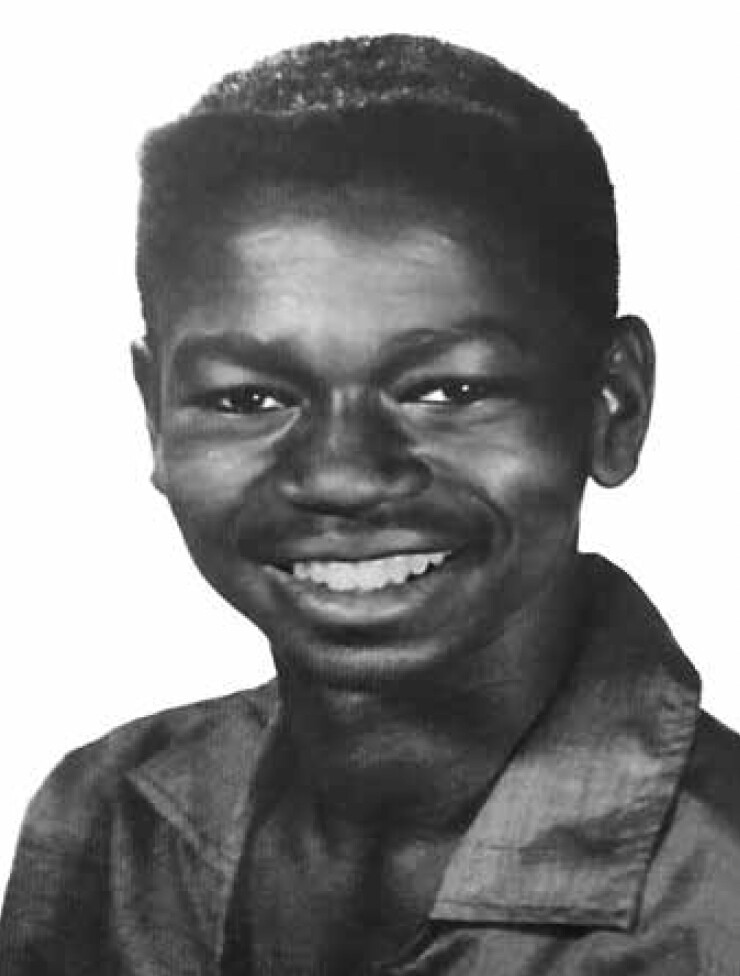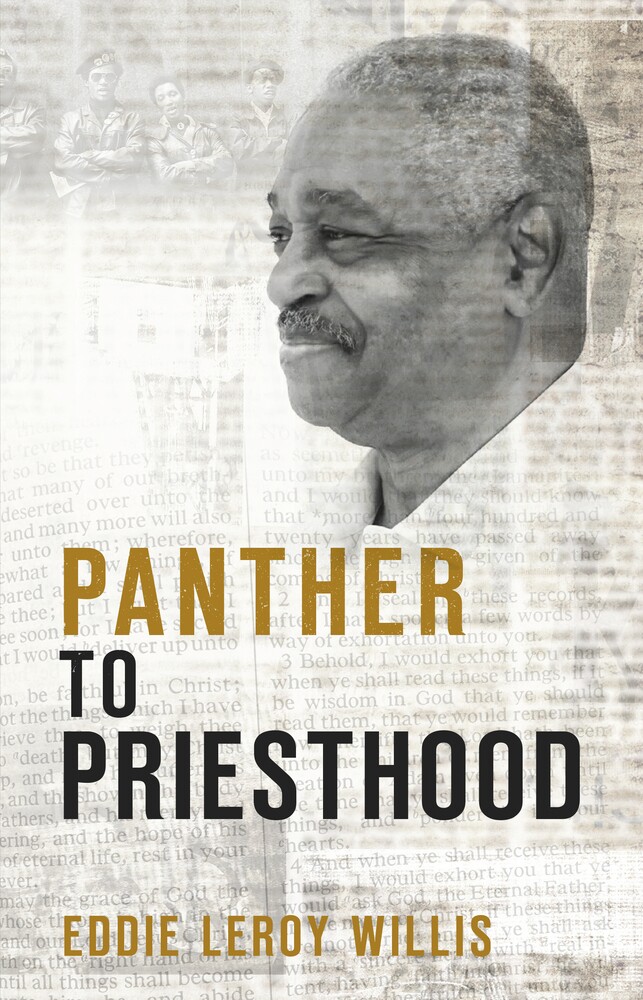This article is excerpted from Panther to Priesthood, the upcoming autobiography of Eddie Leroy Willis. Throughout his childhood, Willis endured and witnessed violent acts of racism in his hometown of Oakland, California.
Willis writes: “I grew up in the slums. The promise of America was on the other side of town. Not my Oakland. Their Oakland. Their city. Their rules. The city managers tried to sell Oakland to America as ‘The Bright Side of the Bay.’ For us? It was Dog Town. Ghost Town and the Lower Bottom. When folks go to developing areas and comment on how happy the poor people are because they ‘just don’t know any better,’ they’re fooling themselves. People know they’re poor. We knew we were poor. We knew that being Black in America came at a price.”

Willis’s teenage and young adult years were tumultuous as a result of his traumatic upbringing. He turned to crime, drugs, and alcohol and joined the Black Panther Party, a Black power organization that promoted Black nationalism, racial equality, and underprivileged children. Later Willis became a born-again Christian; ultimately he and his wife, Wanda, joined The Church of Jesus Christ of Latter-day Saints. In this excerpt, we read how the couple responded to the racism they sometimes encountered in the Church.
Stories about Black folks are hard to tell. We tell stories about our skin, our bones, our blood, and our flesh. We tell stories to each other, to our kids, and to our enemies. When we’re at family barbecues, at church meetings, or in the living room, we understand each other intuitively. There’s a shorthand that we all just get. No dictionary necessary. But when the white folks enter the room, things change.
Translating the Black experience for white folks doesn’t come easily. Living in our skin, in our bones, with our eyes, and with our backstory? There isn’t a crash course available at Barnes and Noble called Being Black: White Folks’ Edition. But that doesn’t mean we don’t have a story to share. I’m going to try to share mine, and this time I’m not going to shift as you enter the room. I’m going to share words as I said them and as they were said to me, including the N-word. In real life, nobody redacted the word when they called me one, so I'm not going to redact it as I share my life.
. . . . . . .
People of African descent have always had to consider racial issues in their lives. Racial issues exist in every field: social, economic, financial, emotional, political, and religious. In the realm of Christianity, none of this should be a stumbling block against how one should behave as a brother or sister in Christ. Christ is the operative word—the living word. Christ’s example shows us how we can have liberty, peace, love, and kindness toward others. Christ’s example also teaches us generosity, humility, and other virtues that quench the issues I’ve already mentioned. These issues take the oxygen from humanity, yet Christ replenishes it.
Many brothers and sisters who are white may feel that they do not need to concern themselves with racial issues. It is a luxury to have the option to ignore important topics that affect others. However, it is also a disadvantage to oneself to choose not to be in harmony with everyone. No one should put his or her head in the sand, including Black people. If we all ignore the problem, then nothing gets solved—including within Christianity. Christ being in one’s life starts the transition to solve all differences, for He is the answer.
One day, I wanted to share something that I had written with another member of the Church. He was a friend and brother in Christ whom I loved and respected. Much of what I had written was a commentary on race and how racial issues have affected the Black community negatively throughout history. I could see and sense disdain in him as I read out portions of my piece. I decided to stop sooner than I had planned and asked for comments and critiques. My friend began to express how sick he was of hearing how badly white people had historically treated Black people. “After all, I wasn’t part of the whites who enslaved Blacks,” he said. He believed that because he wasn’t part of the atrocities of the past, he didn’t have any responsibility to the present. He couldn’t see (or chose not to see) that some of the social, economic, and even environmental structures in place exist due to investing in or voting toward the status quo. He could not see that he was also implicit, whether by choice or by complacency. I had only shared this piece of writing with him to get an opinion on the delivery and flow of the message. It had not been my intention to make him uncomfortable, but he was. “Aren’t things better now?” he asked. I simply told him yes. In that moment, I felt that our friendship was more important than trying to teach him about race.
One of the things that had attracted me to The Church of Jesus Christ of Latter-day Saints was the multi-ethnic look of each congregation. Though it was still predominately white, in my own experience, those I came in contact with did not seem to care about the color of my skin or the fact that I am of African descent. I know that is not the experience of all Black members, but I look forward to the day when it can be.
. . . . . . .
The baggage of race still found me in the Church. It found me one night at the kitchen table with my wife [Wanda] and sister-in-law. They were expressing their joy that I had received the Aaronic Priesthood. Wanda mentioned that she knew that I would honor the priesthood. Of course I would! I had been satisfied with just becoming a member of the Church. When I found out about the priesthood and its origin and that I could become a priesthood holder, I was in awe. I often expressed my spiritual wonder to Wanda, who enlightened me about the history of Blacks in the Church….
On the day of Wanda’s aunt and uncle’s baptism, the bishop stood at the pulpit to address the members with a story. This story, however, was insensitive. He said that he was dreaming about walking down a long road. During this walk, he saw a truck approaching full of watermelons. The truck rolled over, and all of the watermelons went flying! The bishop yelled, in an exaggerated voice, “Oh, Lord! Please don’t let them overtake me!!” His dream made a mockery of all the Black sons and daughters of God who were joining His Church. This was very painful for Wanda, as she had brought so many new Black members to the Church. Wanda knew how valuable being a part of the Church could be for her people, but her own bishop had told an embarrassing, racist joke.
Wanda received a great deal of love and support from members of the Church, but unfortunately, she also experienced painful instances of racism in other members’ words and actions. Whether it was demeaning statements about Black people in Sunday School or a woman in the temple refusing to be helped by Wanda and asking for a white temple worker instead, cruel offenses have come her way many times. Most Black members of the Church could share their own stories of racism and insensitivity at the hands of white members. It is sad but also understandable that some turn away from the Church when they are treated by other members as unwelcome and less than.
. . . . . . .
Wanda’s sister Elva had found great joy in the Church as well, only to be discouraged during a conversation she had with a bishop one day. She had just expressed how she was looking forward to being sealed in the temple of the Lord. The bishop’s response was, “Elva, you would have to be with your people to do that.”
Elva knew that the Church was predominately white, but she still asked him, “What do you mean?”
The bishop informed her that she had to be with “her kind” in order to be sealed in the temple. He was preaching the false notion that people should marry only those from their own race, which unfortunately has been a belief held by many people both inside and outside of the Church. Until that moment, Elva had felt that she was with her kind—brothers and sisters in Christ. That unwelcoming comment caused her to leave the Church for around a year and a half.
Wanda and Elva both later expressed their regret for letting others’ ignorance cause them to lose valuable time in the Church. But in time, they told me more. Wanda and my sister-in-law informed me that people of African descent were not able to have temple access and that the priesthood was not accessible to worthy males of all races until 1978. On June 1, 1978, President Spencer W. Kimball had received the revelation that all worthy men could receive the priesthood. But after learning this, I seriously looked into the matter and found out that there was no record or declaration that any revelation had been received by the First Presidency of the Church teaching that people of African descent could not have temple access. Furthermore, there was no record or official declaration from the First Presidency saying that Black men could not hold the priesthood. The more I discovered, the more I desired to learn about the history of my people in God’s Church.
Both Wanda and I have had times of needing to remember what the core of the gospel is all about and to focus on that, because inevitably, the next offensive or ignorant remark will come. Despite that, we know we want to live with our Heavenly Father for eternity. We want to be with Him, and that should be everybody’s goal. He promised us that if we do the things He says, we can return to Him. We may not feel worthy or feel like we can do it, but He can sanctify us and perfect us if we are willing to trust in Him. And so we continue on with eternity as our goal, even when it is difficult.
. . . . . . .
It is my testimony that God is alive and at the forefront of this Church, His Church, and He moves His Church in a holy way. If you are willing to experience the transforming power of God through His Church, you too can have your life made full, no matter how difficult or complicated your path has been. My life is a testimony to that truth. The Lord has … blessed me and my family abundantly. I’m so thankful that through all the struggle of my life and my quest to understand who I am and why I am here, He has always had an eternal plan for me. He has one for all of us.
Click here to read part two of this book excerpt, and find out details about how Ed joined The Church of Jesus Christ of Latter-day Saints.
Preorder Panther to Priesthood now and save 15% at Deseret Book.
Panther to Priesthood
In this raw, gritty memoir, Willis shares how a lifetime of hardship was, in its own way, preparing him to receive the good news of the gospel of Jesus Christ. Through his unique voice and willingness to share with sometimes painful vulnerability, you will gain valuable perspective to increase in empathy, challenge preconceptions, and overcome the odds through the Savior’s mercy and grace as you witness the lengths to which God will go to save each of His children.


